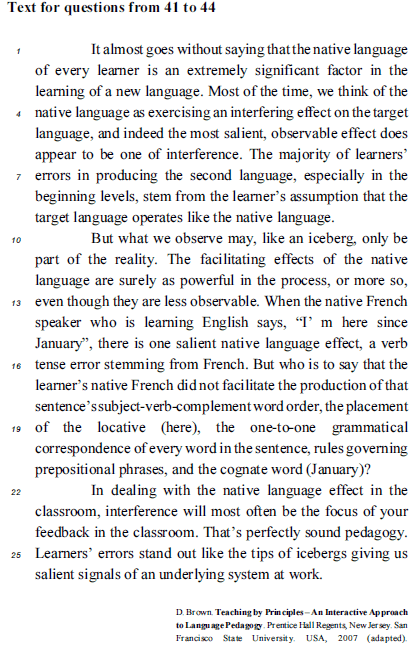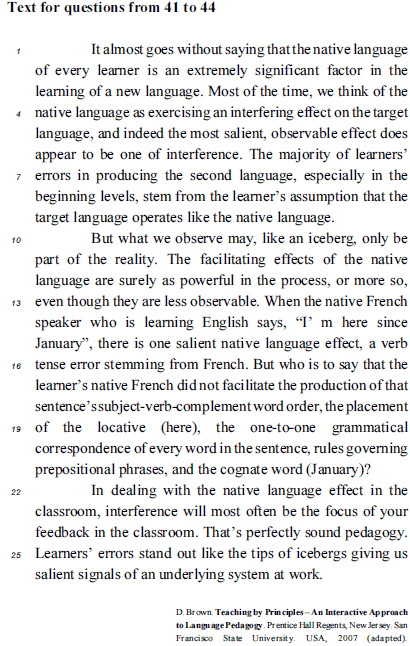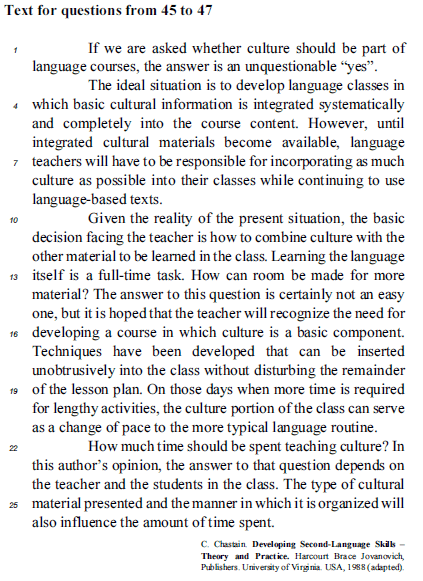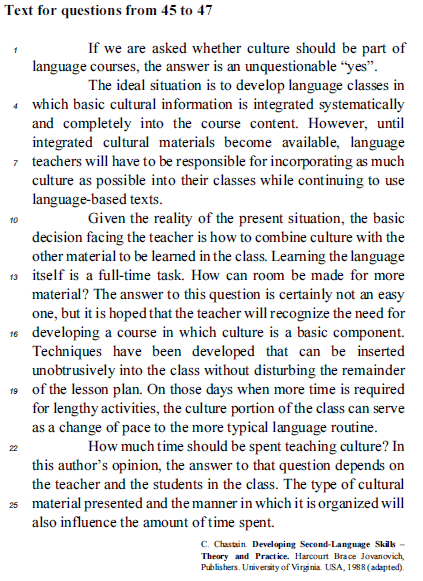Questões de Língua Inglesa do ano 2010
Lista completa de Questões de Língua Inglesa do ano 2010 para resolução totalmente grátis. Selecione os assuntos no filtro de questões e comece a resolver exercícios.

Google, Starbucks and PayPal are mentioned in paragraph 1 (lines 1-8) since they
- A.
are the only well-known companies in America nowadays.
- B.
represent companies which have never delivered high returns to the investors.
- C.
are examples of companies which made significant alterations to their original business plans.
- D.
illustrate the kind of businesses that remained loyal to their original plans and fought for results.
- E.
have founders who have been on the cover of Fortune magazine and are the worlds richest men.

Mulins and Komisar, in paragraph 3 (lines 21-33), state that the typical business startup process is usually unsuccessful because it
- A.
does not invest rich sums or waste years on precise planning to design an elaborate business model.
- B.
shares common characteristics with traditional businesses that have survived crises.
- C.
expects the business to grow rapidly and prosper faster than all other companies in the market.
- D.
rejects venture capital funding and does not expect immediate returns.
- E.
is based on inadequately designed business plans and on market hypothesis that are not previously tested.

Max Levchin, mentioned in paragraph 4 (lines 34-39), can be considered a(an)
- A.
persistent businessman who fought for success.
- B.
careless worker who didnt take time to build a business model.
- C.
foolish entrepreneur who insisted on opening his own company.
- D.
expert in cryptography who failed as a businessman.
- E.
impatient investor who did not believe PayPal would prosper.

The expression ...leaps of faith (line 64) refers to
- A.
a religious conviction that the business project is definitely going to prosper.
- B.
confidence on the various concrete evidences that your business model will surely be successful.
- C.
verything you do not know about the returns of your investment and should not worry about.
- D.
knowledge about historical precedents that are applicable to your companys current situation.
- E.
assumptions about the aspects of the business you propose that are carefully thought of but not tested.

The pair of expressions that express opposing ideas is
- A.
...stuck to... (line 2) abandoned.
- B.
...grows out of... (line 31) develops from.
- C.
...pursue. (line 43) - follow.
- D.
...scupper... (line 62) ruin
- E.
...devising... (line 75) elaborating.

The sentence It may mean trying different prices for your newly developed gadget to see which price makes sales pop. (lines 72-74) implies that
- A.
higher product pricing will certainly lead to more market sales.
- B.
sales are determined solely by the characteristics of the gadget.
- C.
the most appropriate price should be defined by the competitors.
- D.
the cheaper the product is, the more profitable the company will be.
- E.
previous testing of price ranges will help find the one which will boost sales.
Língua Inglesa - Interpretação de Texto - Centro de Seleção e de Promoção de Eventos UnB (CESPE) - 2010

From the text, it can inferred that
- A.
second language learners can be victims of their own native language.
- B.
the more you learn a foreign language the more interference you experience.
- C.
interference is part of a natural process while learning a foreign language.
- D.
native language influence is a handicap against learners of a second language.
Língua Inglesa - Interpretação de Texto - Centro de Seleção e de Promoção de Eventos UnB (CESPE) - 2010

Based on the text, judge the items below.
- A.
Most foreign language learners make unusual mistakes.
- B.
Second language interference can be particularly found at the beginners level.
- C.
French and English are structurally different.
- D.
Icebergs give you tips on how to teach a foreign language.
Língua Inglesa - Interpretação de Texto - Centro de Seleção e de Promoção de Eventos UnB (CESPE) - 2010

Based on the text, it can be concluded that
- A.
culture must be taught as much as language.
- B.
culture and language teaching should be kept apart to a certain extent.
- C.
integrated cultural materials, as it were, are yet to be published.
- D.
language teachers ought to be literature teachers as well.
Língua Inglesa - Interpretação de Texto - Centro de Seleção e de Promoção de Eventos UnB (CESPE) - 2010

According to the text, it can be said that
- A.
activities which take a longer time can be coupled with culture portions.
- B.
time devoted to culture teaching depends on the material available.
- C.
students have to be entirely familiar with the foreign culture at the end of the course.
- D. everyday classes demand as much culture as linguistic knowledge.


